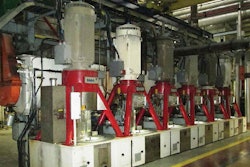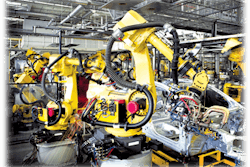A famous Chicago architect, Daniel Burnham, once said, “make no little plans, they have no magic to stir men’s (or woman’s) blood.” Burnham was referring to Chicago’s lakefront development, but it could apply to many food manufacturers’ quest to democratize production data across multiple plants or even enterprises.
One food giant taking a big step toward production data visibility is Norwich, N.Y.-based Chobani and its three production plants in Idaho, New York and Australia. Chobani recently built a $450 million production plant in Twin Falls, ID plant that included Inductive Automation’s Ignition supervisory control and data acquisition (SCADA) platform.
With this new SCADA platform in place, operators are now able to monitor more processing variables and KPIs on the plant floor. Chobani’s processing challenge is the thick, authentic greek style yogurt that resides in large processing tanks at all three of production plants.
At ARC Advisory Group’s annual conference, Hugh Roddy, vice president of global engineering and project management at Chobani, provided a presentation on how his company added new automation components for better data visibility for the entire enterprise.
“Simple clean-in-place (CIP) production graphics are all you need to make a huge change with your operations,” says Roddy. When a tank starts to empty, we —
management — want to see that [production] line go back up.”
For the commissioning of this software-based platform at the Idaho plant, system integrators expedited the installation of monitoring stations via the SCADA platform’s built-in Python scripting engine. This software engine allows integrators to implement graphic script builders and avoid writing script to display operational parameters, such as changing process parameters within the processing tanks.
Operators at the Twin Falls plant can view process parameters, such as CIP, separation percentages and receive instant notifications to their smart phones. Also, large monitoring screens are located on the plant floor.
“Just recently, we had 92 clients online looking at the Chobani dashboard for our tanks, just in the Twin Falls plant alone,” says Roddy.
This democratization of production data allows operators to make quicker decisions inside this 1.4 million sq.-ft. plant, eliminating repetitive operator movement to its two, central controls rooms on upper floors.
“We can't have HMIs on every single line,” said Roddy at the ARC event. “Chobani plans on having seventeen lines at the Twin Falls [plant] within months and that’s why we linked tablets and smart phones to our local area network.”
Chobani also employs Rockwell Autoamtion programmable logic controllers (PLCs) and human-machine interface (HMI) panels in strategic locations throughout its production plants. The food giant also uses Schneider Electric’s Wonderware historians.
Cho Dash apps
Via the SCADA Ignition platform, the company also created “Cho Dash” apps to enable greater visibility to the management suite. The Cho Dash apps allow management to view all process control data from all three production plants within the enterprise. Also included is real-time packaging production monitoring for these global plants. Management is able to send alerts to plant teams if packaging production output falls below certain levels or modifications are required instantaneously, according to Roddy.
The SCADA platform also performs energy monitoring for Chobani via Schneider Electric historians. “We know when a motor has been turned on or off, or a control valve is opened or closed. We calculated energy analytics across the whole plant from power, water or gas, you name it.”
With this company approach from Chobani, “no little plans” are allowed.



















